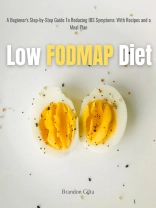Irritable bowel syndrome (IBS) and small intestine bacterial overgrowth (SIBO) are two digestive conditions that often go hand in hand. Fortunately, the low-FODMAP diet is a great way to help manage both of these conditions.
So, what exactly is a low-FODMAP diet? This diet reduces the number of certain carbohydrates-known as FODMAPs-that are difficult for our bodies to digest and can trigger symptoms of IBS and SIBO. These FODMAPs include fermentable oligosaccharides, disaccharides, monosaccharides, and polyols such as honey, wheat products, milk, apples, and garlic.
If you’re considering making the switch to a low-FODMAP diet it’s important to take into account the necessary steps before getting started. It’s useful to identify which FODMAPs may be causing symptoms by keeping a food diary or monitoring what foods are eaten and how they affect your health. Furthermore, consulting a doctor or nutritionist before beginning this diet is paramount as they can provide guidance and advice on what food choices should be included or avoided for the best results.
Once high and low FODMAP foods have been identified, creating an individualized meal plan should take place that takes into account all dietary restrictions while still achieving adequate nutrition at the same time. While on this diet it’s essential to track how each meal makes you feel both mentally and physically so any necessary changes can be made should reaction severity occur.
Finally, after several weeks of adhering to the diet, it’s recommended to reintroduce certain high FODMAP foods one at a time to make sure any reactions are identified quickly to further test whether this approach works for you.
In this guide, we will talk about the following:
- The SIBO and IBS
- Symptoms of SIBO and IBS
- Risk Factors of SIBO and IBS
- Diagnosis of SIBO and IBS
- Medical Treatments for SIBO and IBS
- Causes of SIBO and IBS
- Low-FODMAP Diet
- Principles of Low-FODMAP Diet
- Benefits and Disadvantages of a Low-FODMAP Diet
- Foods to Eat and Avoid
- Sample Meal Plan and Recipes
Starting up with a low-FODMAP diet doesn’t have to be daunting; with dedication from yourself coupled with careful guidance from professionals dramatic improvements in your health can soon come about thanks to following the low-FODMAP regime thoughtfully!
Follow the suggested information present in this guide to effectively manage your IBS symptoms. Most importantly, this guide will teach you to take good care of your body by establishing effective, beneficial, and healthy eating habits.
Innehållsförteckning
Introduction
Small Intestinal Bacterial Overgrowth (SIBO) and Irritable Bowel Syndrome (IBS)
Risk Factors of SIBO and IBS
The Low FODMAP Diet
The Low-FODMAP Diet Program – Week 1
Recipes
The Low-FODMAP Diet Program – Week 2
The Low-FODMAP Diet Program – Weeks 3 and 4
Recipes with High-FODMAP Ingredients
Conclusion
References and Helpful Links












